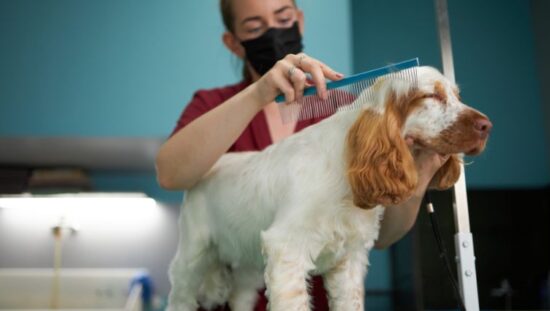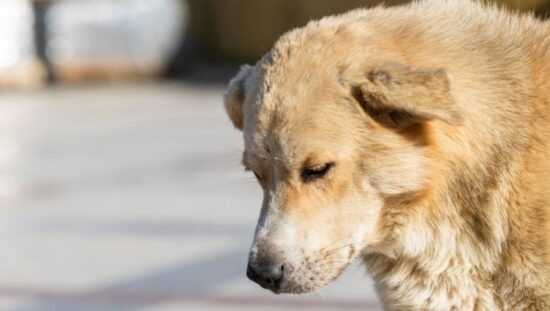Welcome, fellow Golden Retriever fans! As our dear furry friends get older, they enter a new phase of life. In this guide, we’ll explore how to take care of senior Golden Retrievers.
We’ll share helpful tips to make sure their golden years are amazing. Whether you want to give your dog the best care possible or you’re facing the challenges of their aging, this guide can help. So, let’s dive into this journey together!

When is a Golden Retriever a Senior?
Golden Retrievers are considered seniors when they’re between 7 and 10 years old, but keep in mind that not all dogs age at the same pace! Some start acting older earlier, while others stay playful for longer. So, it’s important to pay attention to your dog’s behavior to spot any changes that might mean they’re becoming a senior. These could be things like moving slower, eating differently, or having health issues.
Taking your dog for regular check-ups at the vet can also help you understand if they’re becoming seniors and if they need extra care. Overall, it’s about checking on your furry friend and giving them the right care as they get older.
Signs That Your Golden Is Getting Old
As Golden Retrievers grow older, they may start to show some changes in their bodies and behavior. These changes are normal and just a part of the aging process. Here are some common signs to look out for:
- Slowing Down- You might notice that your once energetic Golden Retriever isn’t as excited about playing or going for long walks. They may prefer shorter walks and more rest time.
- Stiff Joints- Just like humans, older dogs can develop arthritis or other joint issues. They might have trouble getting up or lying down, or hesitate to jump or climb stairs.
- Weight Changes- Senior dogs might gain or lose weight, even if their diet and exercise habits stay the same. Pay attention to their eating habits and body condition to make sure they stay at a healthy weight.
- Changes in Coat- Your dog’s coat might become duller or thinner as they age and they can also develop gray hairs around their face and muzzle.
- Increased Sleeping- Older dogs tend to sleep more than younger ones. If your Golden Retriever is spending more time sleeping and less time playing, it could be a sign of aging.
- Behavioral Changes- Your dog’s personality could change as they age. They may become more anxious, clingy, or irritable. They might also develop new fears or phobias.
- Loss of Senses- As dogs get older, they might start to lose their senses, like hearing or eyesight. They might not respond as quickly to commands or get scared more easily.
- Toilet Issues- Senior dogs might have accidents in the house, even if they’ve been potty-trained for a long time because they have less control over their bladder or bowels as they get older.
How to Care For a Senior Golden
Looking after a senior Golden Retriever needs some extra attention to make sure they stay healthy and happy as they age. Here are some easy tips to help you take care of your beloved furry friend:
- Regular Vet Check-ups- Make sure to take your senior Golden Retriever to the vet for regular check-ups. These visits can help catch any health issues early and ensure your dog stays in good shape.
- Healthy Diet- Give your senior Golden Retriever the right food for their age and health needs. This could mean food that’s easier to digest or has fewer calories to stop them from putting on weight.
- Moderate Exercise- Although exercise is still important for older dogs, it shouldn’t be as intense as before. Quick, easy walks and playtimes are perfect to keep them moving without putting too much pressure on them.
- Comfortable Environment- Make sure your senior Golden Retriever is comfortable. Give them a soft bed to rest on and make sure they have easy access to food and water and a warm place to sleep.
- Dental Care- To keep your dog’s teeth healthy, brush them regularly and give them dental treats or toys. Older dogs can have more dental issues, so taking care of their teeth is super important.
- Joint Care- Give your Golden supplements or medicines your vet suggests. You can also make sure they walk on soft, non-slip surfaces and avoid activities that might hurt their joints.
- Mental Stimulation- Keep your older dog’s brain active with toys they can play with, puzzle feeders, or quick training sessions. Keeping their mind busy is as important as keeping their body moving for their happiness and health.
- Lots of Love- Show your senior Golden Retriever lots of love and attention. Spend quality time together, give them lots of cuddles, and make sure they know how much they’re loved.
I. Health Considerations for Senior Golden Retrievers
Just like people, dogs need extra care as they age. They might have more health problems and need special help. But don’t worry, by learning about these things and taking action, we can make sure our older Goldens feel good and happy as they grow old with us.
Let’s look at some common health issues:
1. Arthritis
Arthritis makes your older dog’s joints hurt and makes it harder for them to move. You might notice them struggling to get up or being less playful than before. But there are ways to help them feel better! Your vet might give them medicine to ease the pain and suggest gentle exercises like short walks or swimming. Also, make sure they have a comfy bed to rest on.
2. Vision and Hearing Loss
As dogs get older, their eyesight and hearing might not be as good as they used to be. They might bump into things or not hear you when you call their name. It can be scary for them, but you can help by keeping things the same around the house and using hand signals to communicate. Regular check-ups with the vet can catch any problems early.
3. Dental Issues
Just like people, older dogs can have problems with their teeth. Things like gum disease or tooth decay can make them uncomfortable. To keep their teeth healthy, try brushing them regularly with special dog toothpaste. Your vet can also check their teeth and clean them if needed.
4. Cognitive Dysfunction
This is when your older dog starts acting a bit different. They might seem confused or forgetful, or they might sleep more than usual. Your vet might suggest special food or supplements to keep their brain healthy. Giving them toys to play with and sticking to a routine can also make them feel more secure.
Veterinary Care
Taking your senior Golden Retriever to the vet regularly is super important to keep them feeling their best. When your furry friend goes for a check-up, the vet can spot any health problems early. It’s like catching a cold before it gets really bad—it’s easier to fix when it’s caught early!
What’s even better is stopping problems before they even start. Your vet might give your dog shots to prevent diseases, give them medicine to keep pesky bugs away or clean their teeth to prevent cavities.
As your dog gets older, they might need different kinds of care. Maybe they need a different medicine or a special diet. Your vet knows all about this and can help you figure out what’s best for your furry friend.
II. Nutritional Needs of Senior Golden Retrievers
Older dogs usually don’t need as much food as younger ones because they’re not as playful. You can ask your vet about switching to a senior dog food formula. These foods have fewer calories and more nutrients that older dogs need to stay healthy and strong.
Keeping your senior Golden Retriever at a healthy weight is important for their overall well-being. If they’re overweight it can be harder for them to move and it can make their arthritis worse. Your vet can help you figure out how much food your dog needs and suggest ways to help them lose weight if they need to. This might mean giving them smaller meals more often or giving them snacks that are low in calories.
Sometimes, senior dogs might need supplements to support their health. Supplements like glucosamine and chondroitin can help their joints and help them move better, which is important for Golden Retrievers who are prone to arthritis. Omega-3 fatty acids, found in fish oil supplements, can keep their skin and fur healthy and help their brains work better. But always talk to your vet before giving your dog any supplements to make sure it’s safe for them.
III. Exercise and Mobility for Aging Dogs
As dogs grow older, they might have less energy or find it harder to move around. But that doesn’t mean they can’t still have fun being active!
Instead of taking long walks, try shorter ones. If they seem tired, it’s okay to take breaks and let them set the pace. Swimming is also great for older dogs because it’s gentle on their joints. If your dog likes water, you can take them for a swim or play in a shallow pool.
Even on days when it’s too hot or cold outside, you can still keep your older dog active indoors. Play gentle games like fetch with a soft toy or hide treats around the house for them to find.
Always watch how your older dog is feeling during exercise. If they seem tired or not comfortable, it’s important to take a break or try a different activity.
For those of you with a new Golden Retriever puppy or considering getting one, make sure your furry friend gets the best start in life with our in-depth guide. Click for expert advice on training your Golden Retriever puppy!
IV. Comfort and Accessibility in the Home
Creating a cozy and accessible home for your older pet is super important for their happiness. Here are some simple changes you can make:
- Ramps- If your senior pet has trouble climbing stairs or getting onto furniture, you can install ramps. Ramps are great because they provide a gentle slope that’s easier on their joints and makes it easier for them to move around.
- Orthopedic Beds- Orthopedic beds are great for older pets like your senior Golden. They give extra support to their aging joints and are super comfy. These beds have extra padding to help ease any sore spots and make them feel better.
- Easy Access to Food and Water- Put their food and water bowls in a spot that’s easy for them to get to. You can also use elevated feeders to reduce strain on their neck and back.
- Slip-Resistant Flooring- Slippery floors can be dangerous for older pets, especially if they have trouble moving around. You can make things safer by putting down rugs or carpet runners to give them a better grip and stop them from slipping and falling.
- Managing Stairs- If your home has stairs, think about putting up baby gates to keep your older pet from going up or down them if it’s hard for them. You can also help them by teaching them to use a ramp (as we mentioned above) or giving them a hand by supporting their weight as they go up or down.
V. Mental Health and Enrichment
As dogs grow older, their brains might not work as quickly as they used to. They can feel confused or bored, just like people. That’s why giving their brains a workout is important. It keeps them sharp and helps them feel good. Also, some older dogs can’t move around as easily, so doing activities that make them think is a good way for them to have fun without needing to move too much. So here is a list of some fun activities for senior dogs:
- Puzzle Toys- Using special toys to get treats is like solving a puzzle for dogs! These toys make them think and keep their brains busy, which is super important.
- Hide-and-Seek- Hide some treats around the house or yard for your dog to find. This activates their sense of smell and keeps them mentally sharp.
- Training Time- Take some time to teach your older dog new tricks or practice ones they already know. It’s not just about learning- it’s also a chance for you to spend quality time together.
- Gentle Play- Play some gentle games like tug-of-war or fetch with soft toys. These activities are not only fun but also help keep your older dog’s body and mind active without putting too much strain on their joints.
- Being Social- Let your dog spend time with other dogs. Dogs are social animals, and spending time with others keeps them happy and engaged. It’s a great way to give mental stimulation and prevent them from feeling lonely or bored.
Conclusion
Caring for a senior Golden Retriever includes a couple of important steps. We need to watch out for their health, make their home comfortable and accessible, and keep their minds engaged.
The key to a healthy dog is to provide regular checkups with the veterinarian, adjust their diet, and provide gentle exercise. Simple home modifications like ramps and cozy beds can make a big difference in their comfort. Keeping their brains active with fun activities is also important. Our senior Goldens can live a happy, fulfilling life as they age gracefully with our attention and love.


